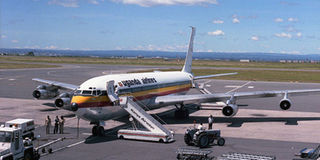Uganda Airlines to return after Air Uganda exit

Rundown. A Uganda Airlines plane at Jomo Kenyatta International Airport. When Uganda Airlines Corporation was to be privatised, there was almost nothing left to be sold apart from three old planes, including a C-130 owned by the Uganda Air Cargo Corporation. FILE PHOTO
What you need to know:
Process. CAA officials say they are putting together a working paper to guide the national stakeholders’ workshop on reviving a national carrier.
Kampala. The government is working on a plan to revive the national airline following Air Uganda’s board decision not to return to the skies, according to the Director of Transport at the Ministry of Works and Transport, Mr Godfrey O. Wandera.
A stakeholders’ workshop is scheduled for next week on October 16. The stakeholders include: Ministry of Finance, Ministry of Works and Transport, Civil Aviation Authority, (CAA) MPs and traders.
Earlier plans by Air Uganda to partner with government in reviving a national airline came to naught. According to Mr Wandera, President Museveni had requested Uganda Development Corporation to buy five per cent shares in the carrier before it was grounded.
“The ministry tried to do some due diligence in a move to acquire some shares but when we asked for account details from Air Uganda, there was no response,” Mr Wandera said.
Commenting on the acquisition of shares, the Works and Transport Minister, Mr Abraham Byandala, said: “There were discussions with Air Uganda and we wanted to make it a national airline but they withdrew, so there is nothing we can do.”
On reviving the national airline, Uganda Airlines, which was liquidated 14 years ago, Mr Byandala said there must be a paper presented before Cabinet first, seeking re-establishment of the carrier.
According to Mr Byandala, Uganda needed to first have control over the Air Uganda board, more so under international rules, the airline could not be designated as a flag carrier in Bilateral Air Services agreements.
According to the Air Uganda board, CAA’s decision to withdraw the licence, prolonged grounding and the takeover of its routes caused the airline massive financial and reputational damage, rendering the restarting process not viable.
Mr Byandala said he had received a letter from Air Uganda communicating their withdrawal as a player in Ugandan aviation sector.
CAA officials also revealed that they are putting together a working paper that will guide the national stakeholders’ workshop on reviving a national carrier.
“If Cabinet approves that we have an airline, it will be up to the Ministry of Finance to start budgeting in the next subsequent financial years,” said Mr Wandera.
Meanwhile, according to Mr Wandera, before Air Uganda’s decision to withdraw from rendering its services to the country, there were several meetings which had resolved that the process of recertification be done fast but Air Uganda did not provide all the requirements.
“The airline had appealed to both the President and the minister to have their licence back but being a technical issue concerning people’s safety, following an audit by the International Civil Aviation Organisation (ICAO), the minister declined in order for the recertification process take course,” Mr Wandera said.
He added that Air Uganda had wanted a temporary Air Operating Certificate but under ICAO, there are no such arrangements.
Before the decision of exiting, Air Uganda had submitted its credentials for recertification to acquire its licence back, which had been withdrawn on June 17 over safety concerns.
According to CAA, the airline had reached the fourth stage of the recertification process but had delayed to return one of its aircraft for inspection.
Air Uganda chairman Mahmood Manji said it did not make sense anymore to continue incurring costs when they were not operating.
“Resuming business was as good as starting a clean-sheet airline as it would require tens of millions of dollars,” Mahmood Manji said.
After the withdrawal of Air Uganda’s licence, fingers were pointed at CAA questioning its ability as a regulator citing noncompliance and institutional incompetence, accusations that CAA has continuously denied.
Mr Wandera noted that CAA has over the last 10 years improved from about 45 per cent compliance in the previous audit compared to about 70 per cent average scored during this year’s ICAO audit. He, however, noted that CAA has not yet attained 80 per cent and above, a globally required standard of safety implementation.
More than 230 staff of Air Uganda, who have been hoping to regain their employment, now have their hopes shattered.


